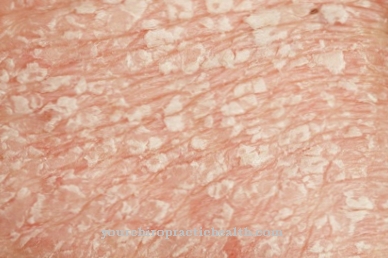As the name suggests, you can tell Bleeding gums (also Bleeding gums) mostly on the traces of blood in the mouth. These are mostly noticed when brushing your teeth by rinsing out the toothpaste.
What is bleeding gums?

Bleeding gums are not only unpleasant, it can also be an indication of a serious gum disease, periodontitis or periodontal disease. If left untreated, it can progress this disease and lead to tooth loss.
Bleeding gums are manifested by blood and pain when brushing your teeth, traces of blood when you bite an apple and, in advanced cases, by swelling that is painful to the touch.
But blood residues can also become visible when eating white bread or other rolls. In addition to bleeding gums, there is usually also inflammation of the gums, so that a dentist should be consulted in the event of this complaint in order to rule out further complications.
In contrast to healthy gums, which are light pink in color, diseased gums can be reddish in color. The increased blood flow then leads to bleeding gums.
causes
Bleeding gums can have different causes. The most common cause of bleeding gums is inflammation of the gums, periodontal disease. Periodontitis occurs when plaque bacteria that are found in dental plaque excrete toxins and acids as metabolic end products. These substances are deposited on the gums and penetrate the gums. The result is inflammation that leads to bleeding gums.
The most common cause of gingivitis and bleeding gums is poor dental hygiene. Bacteria can multiply unhindered and excrete their toxins between the neck of the tooth and the gums. There is a particular risk of inflammation of the gums and bleeding gums when gum pockets have already formed.
Bleeding gums do not always have to have an inflammatory cause. Hormonal changes, e.g. B. During the menopause of the woman, liver damage, various anticoagulant drugs, an over- or underactive thyroid or diabetes can lead to bleeding gums. Even though the gums are not discolored or swollen in these cases, the gums may bleed.
You can find your medication here
➔ Medicines against tartar and tooth discolorationDiseases with this symptom
- Periodontal disease
- Non-Hodgkin lymphoma
- Inflammation of the gums
- Diabetes mellitus
- Menopause
- Hypothyroidism
When should you go to the doctor?
If you have bleeding gums, you do not have to consult a doctor in every case. However, medical treatment is necessary if the bleeding gums do not stop by themselves and lead to severe pain and discomfort. Even if normal consumption of food and liquids is no longer possible due to the illness, medical advice must be sought. If the bleeding gums occur due to a certain drug or toothpaste, this / s can be discontinued or replaced by another / s.
Here too, however, the person concerned should consult a doctor. In any case, a doctor must be consulted if the bleeding leads to inflammation and infections in the oral cavity and on the teeth and gums. This inflammation can spread and lead to very uncomfortable symptoms that definitely need to be treated. In acute cases or after an accident, a hospital can be visited if the bleeding gums are profuse and persist. Usually, the person can see a dentist directly for treatment of the symptom.
Doctors & therapists in your area
Complications
Depending on the underlying disease, bleeding gums are often accompanied by inflammation of the gums or parts of the periodontium. If left untreated, the bleeding persists and threatens to progress. This can lead to painful inflammation, which in extreme cases can lead to the loss of the affected tooth.
Another complication can be periodontitis, in which the gums separate from the gums, creating a bacterial focus with subsequent inflammation of the tooth. If the bleeding gums are then left untreated, the tooth will loosen and eventually fall out. If the microbes enter the bloodstream, the inflammation can also spread throughout the body and lead to serious complications.
Possible sequelae of bleeding gums are atherosclerosis, chronic obstructive pulmonary diseases and inflammation of the internal organs. In pregnant women, bleeding gums may increase the risk of premature birth. Most of the time, however, the complications are limited to the oral cavity: the pain often leads to reduced oral and dental hygiene, and the bleeding leads to nausea and vomiting. With early treatment by a dentist, no serious complications are usually to be expected.
Treatment & Therapy
Bleeding gums need treatment. A mistake is not brushing your teeth because of the toothache. In this way the disease continues to progress. Proper oral hygiene is essential to prevent bacteria from multiplying. In the case of bleeding gums, the dentist should be visited to identify the cause and treat it.
If there are gum pockets, the dentist will measure their depth. The dentist determines the tendency to bleeding gums. Since the jawbone can already be damaged in the case of bleeding gums and inflammation of the gums, the dentist uses x-rays to examine the condition of the bone.
Bleeding gums are prevented by cleaning the teeth holding apparatus, i. H. by removing tartar, existing residues and inflammatory tissue from the gingival pockets. The treatment of bleeding gums can be supported by a special toothpaste and an antibacterial mouthwash solution. The gums can be brushed with tincture of myrrh. If the treatment is successful, the inflammation will quickly subside and the bleeding gums will stop.
Outlook & forecast
If the gums are bleeding, the prognosis is usually very good. If the underlying gingivitis is treated professionally, the bleeding will quickly subside and will not require any further treatment. However, careful oral hygiene is a prerequisite for this. Otherwise there is a risk of bleeding gums again.
If the symptoms are caused by dirty gingivitis, this must first be treated. Professional teeth cleaning, however, also promises quick and complication-free healing of the injuries in the oral cavity.
Pregnancy gingivitis usually heals on its own as soon as the hormonal balance is restored.
In epileptics, the treatment of bleeding gums is sometimes more difficult because the triggering anti-epileptic drugs often must not be stopped. If drugs are the cause of the bleeding gums, the prognosis depends on whether alternative drugs are available and how far the disease has progressed.
Occasionally, secondary diseases such as cysts or abscesses have already developed that require independent treatment. If the underlying disease is not clarified in good time, severe cardiovascular diseases or pneumonia can develop. In general, the earlier bleeding gums are recognized and treated, the better the chances of recovery.
You can find your medication here
➔ Medicines against tartar and tooth discolorationprevention
Preventing bleeding gums caused by inflammation is easy. Proper oral hygiene is the first step. The wrong brushing technique and toothbrushes that are too hard can already encourage bleeding gums. Delicate tissue can be injured quickly, the gums bleed and become inflamed.
A soft toothbrush should be used to avoid bleeding gums. Brushing your teeth should be done without applying too much pressure. To avoid inflammation and bleeding gums, the toothbrush should be changed at least every three months. As a preventive measure, the spaces between the teeth should be flossed after eating. Eating raw fruits and vegetables, as well as whole grain breads, helps maintain dental health and can prevent bleeding gums.
If a serious disease is causing bleeding gums, it is important to treat the disease. After all, it depends on regular visits to the dentist. Bleeding gums can be counteracted with a healthy diet and careful dental care.
You can do that yourself
Various self-help measures can help with bleeding gums. Good dental hygiene is therefore essential. Not only a toothbrush but also dental floss should be used to clean the spaces between the teeth. When brushing your teeth, you shouldn't exert too much pressure.
If the gums are bleeding, the teeth and mouth should be rinsed regularly with tincture of myrrh. The tincture is available in the pharmacy or drugstore. An evening rinse with lukewarm chamomile or sage tea can also be helpful.
Spicy dishes should be avoided if the gums are bleeding. Since the bleeding can result from a lack of vitamin C, a diet rich in vitamins is recommended. For example, fruits, citrus fruits, red peppers and sauerkraut are rich in vitamin C. Affected people can suck off half a lemon in the evening. Garlic can also help against bleeding gums. Garlic also has an antibacterial effect in the mouth and throat.
Rinsing with diluted tea tree oil or with diluted currant juice can also help against bleeding gums. A daily glass of blueberry juice from the pharmacy and / or a mixture of honey and warm milk that is kept in the mouth for a long time can also reduce bleeding gums.
People with bleeding gums can also apply gum balm to the affected areas. It soothes the gums. Gum balm is available in the pharmacy and is applied after brushing your teeth and not rinsed out.



























